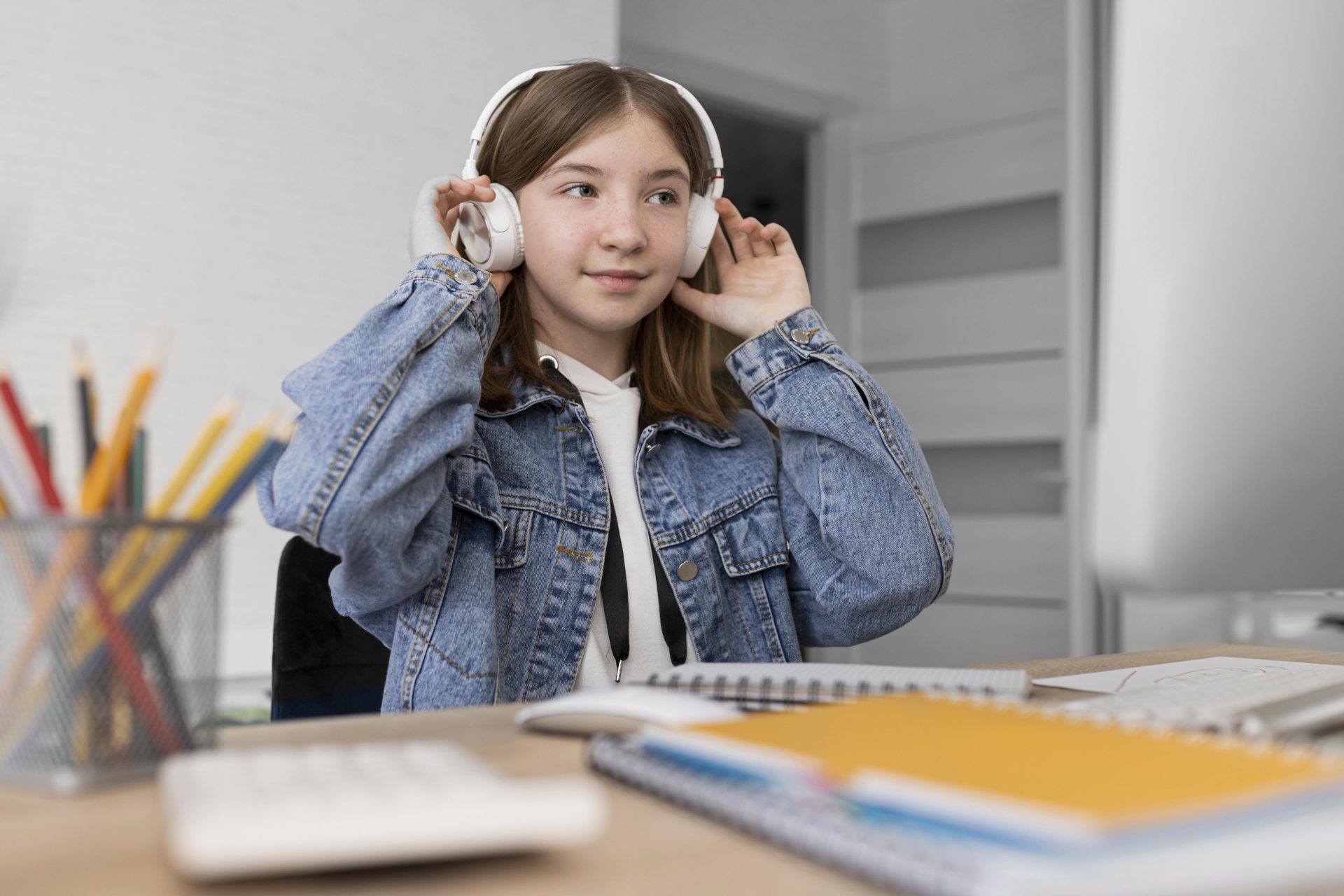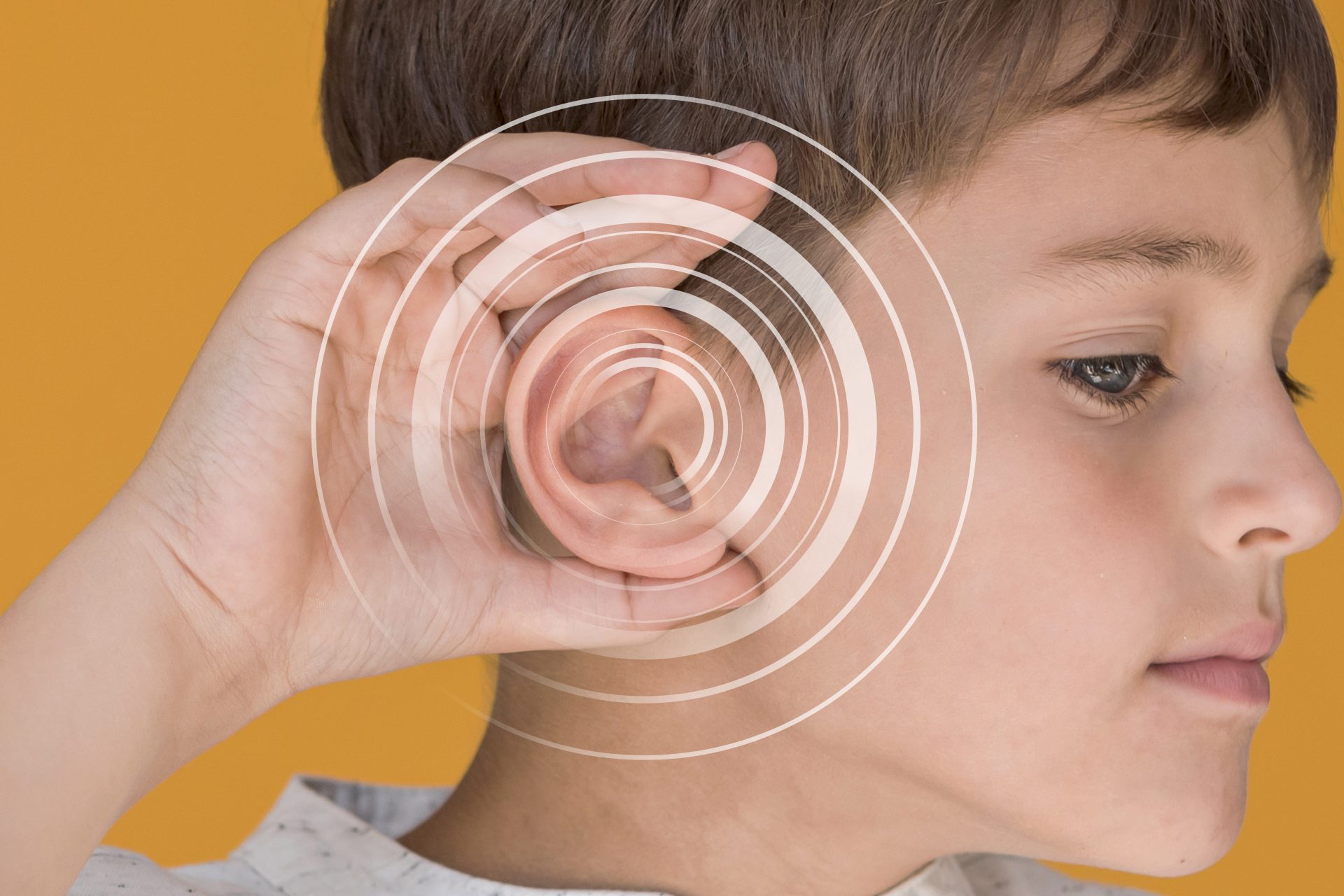Contents
Los alumnos auditivos poseen un talento. Sobresalen en la absorción de información cuando la oyen. Este rasgo distintivo les diferencia de otros tipos de alumnos. Puede contribuir en gran medida a su éxito académico. Para ellos, las conferencias, los debates en grupo y las instrucciones orales son como melodías que se transforman sin esfuerzo en conocimiento. Su capacidad para captar y procesar información a través del sonido puede asombrar a quienes no encuentran estos métodos tan eficaces. Además, recursos como los podcasts y los audiolibros no sirven como entretenimiento, sino como ayudas educativas para los alumnos auditivos. Así que conéctate los auriculares, presta atención y embárcate en el viaje hacia el dominio del aprendizaje.
El estilo de aprendizaje auditivo implica una preferencia por adquirir conocimientos a través de la escucha y retener la información mediante pistas. Para satisfacer las necesidades de los alumnos, los educadores pueden emplear estrategias como la grabación de conferencias en podcasts y el fomento de la participación en las actividades de clase para enriquecer su itinerario educativo.
Características de los alumnos auditivos

Las personas que aprenden mejor escuchando se denominan alumnos. Prefieren aprender en entornos en los que puedan oír palabras habladas, como instrucciones, conferencias y debates. Este estilo de aprendizaje les ayuda a recordar con precisión la información que oyen. Los alumnos auditivos suelen desenvolverse bien en actividades que implican hablar y escuchar, como presentaciones y exámenes.
En las aulas o salas de conferencias, los alumnos auditivos destacan por absorber sin esfuerzo lo que dice el profesor. Tienen talento para entender las diferencias de tono y énfasis, lo que les permite comprender el material que se está debatiendo.
En un debate en clase, un alumno auditivo puede recordar no sólo los puntos concretos expuestos por el orador, sino también el tono utilizado para expresarlos, lo que le proporciona una comprensión global del tema tratado.
Sin embargo, no todos los alumnos auditivos son iguales. Mientras que algunos pueden destacar en entornos de audio de ritmo rápido, otros pueden tener dificultades para concentrarse en medio del ruido de fondo o en casos de discurso verbal prolongado.
Comprender estas características únicas de los alumnos auditivos es crucial para diseñar estrategias de aprendizaje eficaces que se adapten a sus puntos fuertes y a sus dificultades.
Reconocer y aceptar estas características distintivas sienta las bases para desarrollar técnicas específicas que optimicen las experiencias de aprendizaje auditivo.
Técnicas de aprendizaje auditivo

La escucha activa es una habilidad para quienes aprenden mejor escuchando. Imagínese en una clase o en una presentación; para captar y recordar realmente la información es importante implicarse en lo que se está comunicando. Fomentar la escucha significa centrarse en la información que se está compartiendo, buscar claridad mediante preguntas y mantener las líneas de comunicación con el orador.
Cuando participas activamente en conversaciones o conferencias no te limitas a absorber la información de forma pasiva. La escucha activa le permite procesar y asimilar el contenido que se le presenta, haciéndolo más significativo y fácil de recordar. Además, si haces preguntas y pides aclaraciones, mejorarás tu comprensión. Contribuir a la comprensión del tema.
Repetición verbal
La repetición verbal es una técnica valiosa para reforzar el aprendizaje de los alumnos auditivos. Al recitar puntos clave en voz alta o explicar conceptos complejos a otras personas, un individuo puede reforzar su comprensión del material a través del compromiso verbal. Este método no sólo ayuda a retener la memoria, sino que también mejora la comprensión general al permitir al alumno articular y expresar conceptos con sus propias palabras.
Mnemotecnia
La mnemotecnia es algo parecido a los atajos de memoria. Para los que aprenden mejor escuchando, utilizar rimas, melodías pegadizas o abreviaturas puede ayudar mucho a recordar detalles. Al vincular el contenido con frases o secuencias, los alumnos auditivos pueden recordar y acceder fácilmente a la información cuando estudian para los exámenes o realizan actividades de aprendizaje cotidianas. Es como tener una lista de reproducción de técnicas que facilitan el recuerdo.
Por ejemplo, al aprender una lista de elementos o pasos, crear un acrónimo utilizando la primera letra de cada elemento puede ayudar a recordar toda la lista con facilidad. Además de ser divertidos y atractivos, estos dispositivos mnemotécnicos aprovechan la capacidad de los alumnos auditivos para procesar y retener información basada en sonidos.
Al adoptar estas técnicas, los alumnos auditivos pueden aprovechar su preferencia natural por el aprendizaje basado en sonidos para mejorar su rendimiento académico y ampliar sus conocimientos de forma eficaz. Cada estrategia es fundamental. Refuerzan la retención de la memoria y favorecen la comprensión profunda de las materias. También fomentan un enfoque proactivo del aprendizaje.
En la era de los medios digitales y los vastos recursos informativos, aprovechar los contenidos orales se ha convertido en una habilidad de valor incalculable. Exploremos cómo se puede utilizar esta agudeza auditiva para navegar y prosperar en nuestro mundo cada vez más centrado en lo oral.
Aprovechar el contenido hablado

Imagínese aprendiendo escuchando. Al sintonizar un flujo de podcasts, audiolibros y vídeos educativos, quienes aprenden mejor escuchando pueden dedicarse plenamente al material que mejor se adapte a su método de aprendizaje preferido. Es como tener un profesor particular que te da la información directamente y estimula tu mente de una manera perfectamente adecuada para absorberla.
Escuchar podcasts relacionados con el material de tu curso puede proporcionarte diferentes perspectivas de expertos en la materia. A menudo, este tipo de medios ofrecen puntos de vista matizados sobre diversos temas, lo que puede enriquecer su comprensión de la materia más allá de lo que podrían ofrecer los libros de texto o los materiales escritos.
Por ejemplo: Imagina que sintonizas un podcast en el que un reputado biólogo habla de las últimas investigaciones en genética mientras vas al trabajo o sales a correr. Este método de aprendizaje dinámico mantiene tu mente estimulada incluso cuando no estás sentado en una clase formal.
Del mismo modo, los audiolibros le permiten abarcar un amplio material de lectura sin necesidad de fijarse en el texto escrito. Mientras pasea, cocina o simplemente se relaja, puede absorber conocimientos sin esfuerzo. Esta forma de exposición a la literatura alimenta la mente con información. Se parece más a disfrutar de una historia cautivadora que a un estudio tedioso.
Considera también la posibilidad de incorporar vídeos educativos a tu rutina de aprendizaje. Plataformas como YouTube son un tesoro de contenidos visualmente estimulantes que se adaptan a diversas materias y estilos de aprendizaje. Estos vídeos combinan imágenes atractivas con una narración clara. Transforman conceptos abstractos en ideas. Las ideas resuenan en los alumnos auditivos.
Estos formatos multimedia estimulan los sentidos auditivos, permitiéndole captar temas complejos a través de cautivadoras presentaciones audiovisuales.
Una ventaja notable de aprovechar los contenidos hablados es la capacidad de reforzar el aprendizaje mediante la repetición, sin el tedio que a menudo se asocia a los métodos de repaso tradicionales. Rebobinar o repetir los segmentos clave hasta que queden firmemente grabados en la memoria es un lujo que sólo pueden permitirse los medios de contenido oral.
Por ejemplo, escuche un episodio de podcast informativo dos o tres veces. Esto puede consolidar la comprensión mejor que releer los párrafos de un libro de texto. Se debe a la fluidez y entonación naturales del habla.
El uso de este tipo de recursos abre nuevas vías para que los alumnos auditivos conecten con sus estudios de forma activa y aproveche su afinidad por los contenidos hablados.
De este modo, los alumnos auditivos pueden manipular las ondas sonoras para una absorción eficaz de los conocimientos. A continuación, exploraremos cómo la música, en concreto, desempeña un papel vital como ayuda al aprendizaje.
La música como ayuda al aprendizaje

Para quienes aprenden mejor escuchando, la música puede ser como un amigo de confianza que les guía a través de las complejidades de la información. Los estudios indican que determinados tipos de música de fondo, como las melodías ambientales, pueden crear un entorno ideal para el aprendizaje. Los patrones y armonías de la música ofrecen una sensación de orden y paz que resuena en los alumnos y les ayuda a mantener la concentración y el interés en sus tareas.
Sin embargo, no toda la música es igual de beneficiosa para los alumnos. Las investigaciones sugieren que la música con un tempo de entre 60 y 80 pulsaciones por minuto puede aumentar la concentración y las capacidades cognitivas. Este ritmo establece un compás que se alinea con los ritmos cerebrales fomentando un estado de alerta propicio para el aprendizaje productivo. Cuando seleccione música para acompañar las sesiones de estudio, opte por temas que estén dentro de este rango de tempo para optimizar sus efectos.
Además, se ha comprobado que la música clásica, especialmente las composiciones barrocas, mejora la concentración y la retención de información en estudiantes auditivos. Los complejos patrones de la música barroca son relajantes. Pueden estimular la mente sin causar distracción ni fatiga. Cuando le cueste concentrarse en los estudios, ponga algo de Bach o Vivaldi. Aumentará la concentración.
Además, los sonidos naturales como el fluir del agua o el canto de los pájaros reducen el estrés y la ansiedad. Crean un entorno tranquilo para el aprendizaje. Los sonidos calman. Favorecen la relajación y mantienen la mente atenta. Esta combinación es perfecta para aumentar la productividad en el estudio.
Apoyo estadístico
Según un metaanálisis publicado en el Journal of Educational Psychology, la música con un nivel moderado de complejidad puede ayudar a consolidar la memoria y a recordar a los alumnos auditivos.
Recuerda que es esencial experimentar con distintos tipos de música para encontrar la que mejor se adapta a ti como estudiante. Tus listas de reproducción de estudio deben ajustarse a tus preferencias personales, sin dejar de respetar los principios aquí descritos para optimizar su eficacia.
Si añade música de fondo adecuada a su rutina de estudio, podrá crear un entorno adaptado a su estilo de aprendizaje auditivo. Esto mejorará en gran medida tu concentración y tu memoria.
Aplicar el aprendizaje auditivo a todas las asignaturas

El aprendizaje auditivo ofrece una ventaja, ya que puede incorporarse eficazmente a todas las disciplinas académicas para reforzar la comprensión y la memoria. En el ámbito de la historia, sumergirse en relatos o discursos a través de la audición puede dar vida al pasado, a diferencia de la lectura. El arte de narrar episodios como anécdotas vívidas puede hacer que el contenido sea más memorable y cautivador para los alumnos auditivos.
Pensemos, por ejemplo, en la posibilidad de escuchar la narración del discurso de Gettysburg de Abraham Lincoln en lugar de basarse únicamente en los relatos escritos de un libro de texto. La resonancia emotiva y las sutilezas que transmite la voz del orador pueden profundizar la comprensión y la conexión emocional con ese momento de la historia.
Cuando se trata de conceptos científicos, los podcasts educativos son un tesoro para los estudiantes auditivos. Proporcionan una experiencia de aprendizaje inmersiva al ofrecer acceso a debates, entrevistas y explicaciones sobre temas científicos complejos dirigidos por expertos. Este enfoque dinámico permite a los alumnos asimilar la información mediante la escucha activa y la participación.
Por ejemplo, podcasts como «Science Weekly» o «TEDTalks Science» pueden profundizar en diversos campos científicos, desglosando intrincadas teorías y descubrimientos de forma accesible. Es explorar la física cuántica. O desentrañando la biología evolutiva. Los podcasts educativos se adaptan al gusto de los estudiantes auditivos por aprender a través del sonido.
Además, el aprendizaje de idiomas es otro campo en el que el aprendizaje auditivo puede brillar con luz propia. Escuchar a hablantes nativos conversar en una lengua meta permite a los alumnos auditivos captar la pronunciación, la entonación y los matices lingüísticos correctos. Este método es inmersivo. Fomenta una comprensión profunda de las estructuras lingüísticas y ayuda a aprender vocabulario.
Las narraciones históricas y los podcasts educativos ofrecen valiosos recursos para los estudiantes auditivos de diversas asignaturas, proporcionándoles experiencias inmersivas que mejoran la comprensión, la retención y el éxito académico en general. Estas aplicaciones prácticas permiten a los estudiantes auditivos aprovechar el poder del sonido como catalizador de un aprendizaje eficaz.
Dominar el aprendizaje auditivo requiere buenas técnicas. También necesita herramientas y recursos fiables. Exploremos ahora la gama de recursos adaptados específicamente a los alumnos auditivos.
Herramientas y recursos para estudiantes auditivos

Para los alumnos auditivos, el acceso al material de aprendizaje a través de diversos formatos de audio es vital. Estas herramientas no sólo facilitan el acceso a los contenidos, sino que también mejoran la comprensión y la retención. Echemos un vistazo a algunos de los recursos clave que resultan inestimables para los alumnos auditivos.
Audiolibros
Los audiolibros son un recurso para quienes aprenden mejor escuchando. Proporcionan una forma de interactuar con el contenido escrito, facilitando su acceso. Los audiolibros, ya sean de ficción o de no ficción, crean una experiencia adaptada a los alumnos. Al sintonizar historias narradas, los alumnos auditivos pueden captar bien la información. Mejoran su capacidad de retención y comprensión.
Además, los audiolibros suelen contar con narradores profesionales que enuncian las palabras con claridad, lo que permite a los alumnos auditivos captar nuevo vocabulario y matices lingüísticos. Esta exposición a un lenguaje bien hablado puede contribuir significativamente a sus habilidades comunicativas en general, lo que convierte a los audiolibros no sólo en una herramienta de aprendizaje, sino en un valioso activo para su desarrollo personal y profesional.
Podcasts
Los podcasts abarcan una amplia gama de temas y son un recurso inestimable para los estudiantes auditivos. Ofrecen contenidos diversos que responden a distintos intereses y actividades académicas. De la historia a la ciencia, de la literatura a la actualidad, los podcasts ofrecen debates y análisis en profundidad que enriquecen la experiencia de aprendizaje de los alumnos auditivos. Además, los podcasts suelen incluir entrevistas, debates y narraciones, que atraen al oyente de forma dinámica. Esta variedad de contenidos estimula el pensamiento crítico y la capacidad de resolución de problemas de los alumnos auditivos, fomentando un enfoque integral del aprendizaje.
Aplicaciones de grabación de voz
Las aplicaciones de grabación de voz son cruciales para las personas que aprenden mejor escuchando. Estas herramientas permiten a los estudiantes grabar las clases, crear ayudas al estudio y participar en autoevaluaciones. Al grabar las clases y los recursos de estudio, los estudiantes auditivos pueden consolidar su comprensión escuchando. Además, las aplicaciones de grabación de voz fomentan la autonomía en la educación y permiten a los estudiantes gestionar sus estrategias de aprendizaje. En cuanto a la autoevaluación, estas aplicaciones permiten a los alumnos expresar su comprensión de las ideas y mejorar su capacidad para comunicar sus pensamientos con claridad.
Disponen de estas potentes herramientas. Pueden utilizarlas para ampliar su aprendizaje en muchas asignaturas.
Al adoptar estas herramientas y recursos centrados en el audio, los estudiantes auditivos pueden desbloquear un viaje de aprendizaje enriquecido que se alinea con su estilo de aprendizaje preferido.
El éxito futuro de su hijo es nuestro principal objetivo en Legacy Online School. Visite nuestro sitio web para explorar las numerosas oportunidades de la escuela en línea Legacy.
Echa un vistazo a los programas de la escuela en línea Legacy:
Escuela primaria de Legacy Online School pone el listón muy alto. Se trata de una educación de calidad. Nos esforzamos por despertar la curiosidad. También nos esforzamos por fomentar la creatividad. Ofrecemos un sólido plan de estudios. Para ello contamos con la ayuda de educadores cualificados.
Legacy Online Middle School ofrece educación digital. Está diseñada para estudiantes de enseñanza media. La escuela se enorgullece de ofrecer clases online en directo impartidas por profesores titulados. Las clases son en línea e interactivas.
Legacy Online High School es un método único de aprendizaje en línea cuidadosamente diseñado para estudiantes de secundaria. Combina el aprendizaje síncrono, una amplia gama de métodos pedagógicos y un énfasis en la accesibilidad.
La escuela en línea Legacy ofrece lo mejor curriculum
Nuestro riguroso plan de estudios garantiza que los graduados estén bien preparados para las universidades y los centros de trabajo de todo el mundo. Además, nuestros vibrantes clubes virtuales conectan a estudiantes de todo el mundo.





